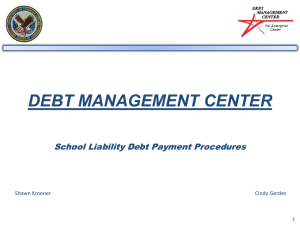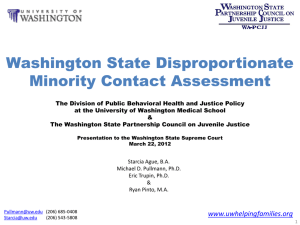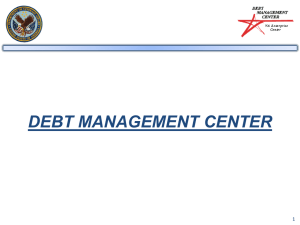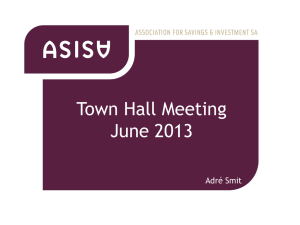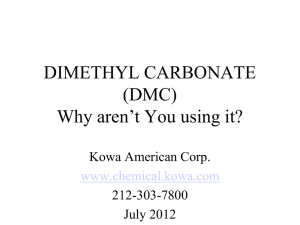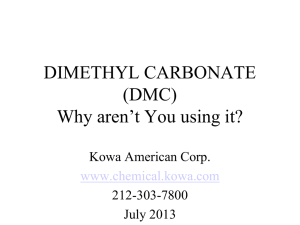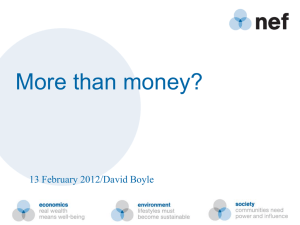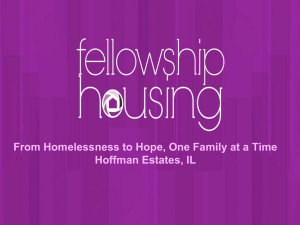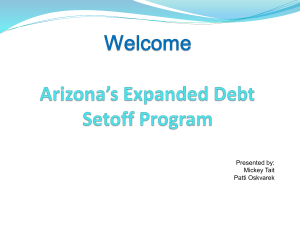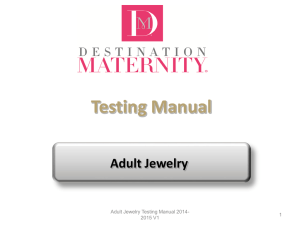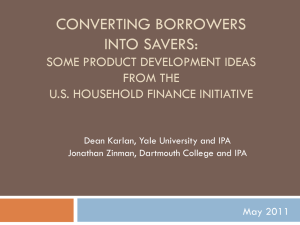DEBT MANAGEMENT CENTER - National Association of Veteran`s
advertisement
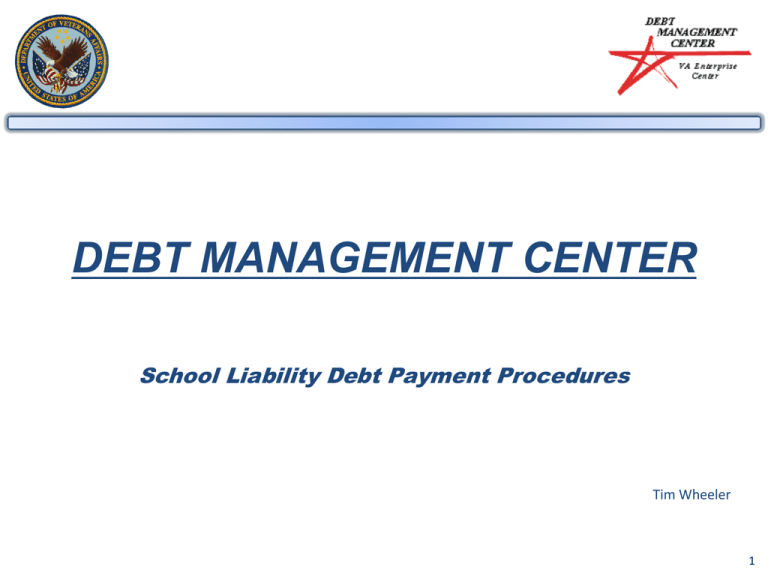
DEBT MANAGEMENT CENTER School Liability Debt Payment Procedures Tim Wheeler 1 DMC Mission Statement Our primary mission is to collect debts in the most efficient and cost effective manner possible while maintaining compassionate, high quality service to Veterans and their families. 2 Debt Management Center • We are located with the VA Regional Office in St. Paul, MN • Debt Management Center (DMC) was established in July 1991 • We provide debt collection services to the Veterans Benefits Administration (VBA) and the Veterans Health Administration (VHA) • We have jurisdiction for collection of overpayments for Compensation, Pension, Vocational Rehabilitation, Education, and Home Loan Guarantee benefits • We service approximately 575,000 accounts with a portfolio totaling about 1.5 billion dollars • Our office is staffed by 165 employees; almost half of our staff are Veterans • 56 telephone financial specialists answer about 2,300 phone calls per day 3 What action creates debts? • Terminations – Student stopped attending or never attended • Reductions/Adjustments – Student reduces course load • Amendments – Tuition and/or fees changed – Based other tuition and fees received (waivers/scholarships) • Incorrect Amount Certified to VA – Paid for wrong student – Paid more money than certified 4 Why Would a School Have a Debt? • Student never attended classes for which he/she was certified (regardless of the reason for non-attendance) • The student completely withdraws on or before the first day of the term. If a student reduces, the debt shall be assessed to the student • The school received a payment for the wrong student. • The school received a duplicate payment • The school submitted an amended enrollment certification and reported reduced tuition and fee charges, reduced Yellow Ribbon amount, or both • The student dies during the term or before the start of the term • VA issued payment above the amount certified on the enrollment certification that was used to process the payment (VA data entry error) and was refunded to the student is a valid debt 5 The Collection Process Amended 1999B is submitted to the Regional Processing Office (RPO) – Letter sent to School Certifying Official (SCO) – Letter contains Term dates and the reason for debt – Letter advising Notification of Indebtedness (NOI) will be sent by the Debt Management Center (DMC). DMC letter will contain payment and dispute information 6 The Collection Process Cont’d First Notice of Indebtedness sent by DMC, letter provides information regarding: – Where to send payment, including return envelope and payment remittance stub – E-mail address: dmcedu.vbaspl@va.gov – Toll-free number for DMC: 1-800-827-0648 All disputes should be processed through DMC to ensure proper follow-up and possible suspension of collection action, all disputes should be submitted via email to dmcedu.vbaspl@va.gov. All payments should go to the Debt Management Center not the RPO. 7 The Collection Process Cont’d Second Notice of Indebtedness sent by DMC, 30 days from initial notification letter, advises: – Where to send payment, including return envelope and payment remittance stub – E-mail address: dmcedu.vbaspl@va.gov – Toll-free number for DMC: 1-800-827-0648 All disputes should be processed through DMC to ensure proper follow-up and possible suspension of collection action, all disputes should be submitted via email to dmcedu.vbaspl@va.gov. All payments should go to the Debt Management Center not the RPO. 8 The Collection Process Cont’d Third Notice of Indebtedness sent by DMC, 30 days from second notification letter, advises: – Where to send payment, including return envelope and payment remittance stub – E-mail address: dmcedu.vbaspl@va.gov – Toll-free number for DMC: 1-800-827-0648 If payment is not received and applied within 60 days, account will be referred to the U.S. Department of Treasury, Treasury Offset Program (TOP). 9 Why TOP? • On occasion, an entity’s indebtedness to the Federal Government will become delinquent. As required by Federal law, Federal agencies submit these delinquent debts to the Treasury Offset Program (TOP) for interception of eligible Federal and state payments payable to the delinquent debtor, a process known as “centralized offset”. • TOP is a centralized offset program managed and operated by the Department of Treasury’s Financial Management Services (FMS). • Before submitting a debt to TOP, a creditor agency must certify that the debt is valid, delinquent and legally enforceable and that the agency complied with all the due process pre-requisites prior to offset. This means that, at least 60 days prior to the submission to TOP, the creditor agency has sent notice to the debtor stating the amount and type of debt and the agency’s intention to refer the debt to TOP for offset. The creditor agency provided the debtor with the opportunity to resolve the debt through a repayment agreement and/or to dispute the agency’s claim. 10 Why TOP cont. • After a nontax debt has been submitted for offset, TOP compares a payee’s taxpayer identification number (TIN) and name. If there is a match, the payee’s account is intercepted in the amount and to extent authorized by Federal law. The intercepted payment is applied to the debtor’s debt balance. • A TIN identifies the debtor in the same way that it identifies the taxpayer for purposes of the Internal Revenue Code. Pursuant to regulations governing TOP, all subdivisions or organizations sharing a single TIN are responsible for all debts associated with that TIN. TREASURY DIRECT CONTACTS • Treasury Help Line: 1-800-304-3107 11 Improvements in TOP Refund Process • In April 2013, DMC began processing all TOP refunds – – Refund is sent to the School Certifying Official Address is based on Facility Code debt was established for and current WEAMS address • New Process Includes – – – – – – – A letter sent to the institution receiving the refund provides: • Name of Student • Last four of Student’s SSN • School Facility Code Number • TOP Trace Number Contact information for Treasury regarding details on what federal payment was offset Treasury can provide the detail regarding the federal payment that was offset, DMC does not currently have access to that information If this is a duplicate offset, fee will be included in the payment, if appropriate Each amount is thoroughly researched to determine if the fee is due Not bundled with other payments Response time is under 10 business days from when DMC receives funds 12 What Happens When DMC Receives Your Dispute • • • • • • We review your email to determine why you are disputing the debt, and if DMC can answer your question and resolve your dispute If DMC can answer your question, we provide a response to your email If DMC needs more information to answer your question, your dispute is forwarded to the Regional Processing Office (RPO) for a detailed review. Once the review is completed, the response is forwarded to DMC and we contact you regarding the findings Collection action is suspended on your account until the dispute is resolved, unless your account has already been referred to the Treasury Offset Program (TOP). In this case, your account is not recalled from TOP DMC will acknowledge receipt of your dispute inquiry and will keep you apprised of any change in collection status The response from the RPO should be received within 30 days. If 30 days has passed and DMC has not received an answer to the dispute, we contact the RPO directly requesting status. Disputes are tracked by DMC on a reoccurring basis 13 Improvement of Dispute Process • Prior to April 2013 schools had two options for disputing their debts 1. 2. Contact the RPO Contact DMC • This process duplicated efforts and created confusion. In April 2013, Veterans Benefits Administration, Office of Resource Management and DMC collaborated and issued VA-wide Guidance on a new dispute process • DMC is now a single point of contact for schools for any established debts being disputed. This allows: 1. 2. 3. 4. Single point of contact for disputes Reduced confusion and less duplication of efforts Ensures collection efforts are suspended during a timely dispute inquiry Allows clear oversight in tracking and addressing outstanding disputes 14 What Happens After my Dispute has Been Answered? • Debt is cleared, if not valid • Collection action resumes, if appropriate 1. Email sent from DMC with decision 2. Next appropriate collection letter is sent 3. In May 2013, DMC changed the timeframe in which disputed debts are referred to TOP a. Previously, if a debt was deemed valid and removed from dispute status, collection action resumed immediately b. Collection action is now suspended for an additional 30 days to allow time to repay the debt before TOP referral c. This only occurs when the 3rd Notice of Indebtedness has already been sent 15 What Procedures Should You Follow When Sending Payments to DMC? 1. You should not send any funds to DMC until your school receives a collection letter from DMC 2. If you did not receive a collection notice or letter from DMC or a letter from your education RPO referencing a debt, verify with your certifying official that the information regarding any change in enrollment or tuition and fee charges was sent to the Education RPO, before you send payment 1. If you send payment without verifying that a debt exists and you do not include the tear off payment stub from the DMC letter, application of your payment will be delayed 2. The DMC payment stub, from the bottom of our letter, should be included with your payment. This will expedite processing 16 Can You Send One Check for Multiple Students? Yes, however, you should send the remittance stubs with your payment and a list with the file numbers and dollar amounts the check covers. You need to make sure that the check you send totals the amount of debts you want it applied to. If you send additional funds and DMC does not know what debt to apply it to, DMC may have to return the check to you for additional information. 17 What if you sent payment to the RPO before the DMC/Muskogee consolidation and the debt has not cleared? • Gather information about the payment. We will need to know the date, amount, and number of the check, as well as the Social Security Number of the student • If it was cashed, please provide DMC with a copy of the front and back of the check • Fax the information to DMC, Attention: Correspondence Unit at 612-970-5782, or you can email DMC at dmcedu.vbaspl@va.gov • DMC will follow up with the RPO • If payment was not applied and an offset was received through TOP, the RPO of jurisdiction will refund your payment and the fee charged by Treasury 18 How Does the School Make a Payment With DMC? ACH payments can be made on our PayVA website: www.pay.va.gov The person making the payment will need some of the information listed on DMC’s letter to ensure proper credit. DMC’s mailing address is: DMC (389) PO Box 11930 St. Paul, MN 55111-0930 19 What if You Need to Contact DMC Directly? E-mail inquiries may be directed to: dmcedu.vbaspl@va.gov Otherwise, the toll free number to our call center is: 1-800-827-0648 1-612-970-5782 fax 20 Things You Should Know • All disputes should be emailed to dmcedu.vbaspl@va.gov • Wait to receive the DMC letter before submitting your payment. Include the payment remittance slip with your check • DMC’s toll-free number is 1-800-827-0648 • DMC can provide you with an updated spreadsheet to include all your current debts. Send an e-mail request with your facility code(s) to dmcedu.vbaspl@va.gov • If you have received a DMC letter advising your account will be referred to TOP, your payment must be applied to the debt within 60 days of the date of the DMC’s letter 21 Other Enhancements • January 2012, Centralized Processing of School Liability Collections – 1. DMC’s current business standard is two business days – 2. Muskogee RPO researches unidentified payments for proper application • May 2012, Improved communication efforts between DMC and Schools – 1. DMC created an unique email account for school debt inquiries/disputes – 2. Response within 5 business days – 3. Continuous training to DMC staff to improve quality 22 Other Enhancements • December 2012, DMC reached out to Department of Treasury – 1. Clear up questions on Fedwire payments – 2. Contact information for Treasury – 3. Treasury will provide school listings of debts referred to TOP by TIN (taxpayer identification number) by calling Treasury Help – 800-304-3107. To receive this report the school Controller needs to send Treasury written authorization requesting release of the information – 4. Information and guidance on TOP debt collection process – 5. Recommendations to avoid payment delays when TOP offsets occur • March 2013, DMC modified collection letters – 1. Changes included a) Centralization of the dispute process b) Detailed information regarding our Call Center 23 Other Enhancements • April 2013, Centralized dispute process – – – – 1. 2. 3. 4. Single point of contact for disputes Reduced confusion and less duplication of efforts Ensures collection efforts are suspended during a timely dispute inquiry Allows clear oversight in tracking and addressing outstanding disputes • May 2013, Program changes – – 1. Ensures for a full 60 days after the 3rd collection letter before referral to TOP 2. Payment receipt or paid in full letters for TOP offsets • Future – 1. Continue to participate in School Association Conferences a) Education b) Improve VA policies and procedures c) Establish dialogue and communications – 2. VBA is working to auto-generate current debt listing based on address in WEAMS file 24 Questions 25
